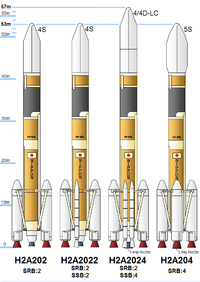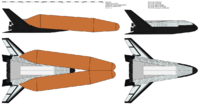Space and Aeronautical Research Agency (Kozakura): Difference between revisions
No edit summary |
|||
| (5 intermediate revisions by the same user not shown) | |||
| Line 11: | Line 11: | ||
| size = 200 | | size = 200 | ||
| caption = Mon | | caption = Mon | ||
| acronym = | | acronym = SARA | ||
| owner = Joint | | owner = Under Joint-Jurisdiction: | ||
* [[Kozakura|National Development Directorate]] | * [[Kozakura|National Development Directorate]] | ||
* [[Kozakura|Education Directorate]] | * [[Kozakura|Education Directorate]] | ||
| Line 23: | Line 23: | ||
| motto = | | motto = | ||
| administrator = Taryaba Chinchoshi | | administrator = Taryaba Chinchoshi | ||
| budget = | | budget = R¥1.56 trillion<br> (US$10 billion) (FY2021) | ||
| language = | | language = | ||
| URL = | | URL = | ||
}} | }} | ||
The '''Space and Aeronautical Research Agency (SARA)''' (Japanese: 宇宙航空研究開発機構, ''Uchū kōkū kenkyū kaihatsukikō'') is the [[Kozakura|Kozakuran]] national air and space agency. Jointly-managed by three governmental directorates, SARA was formed on 24 February 1987. SARA is responsible for research, technology development, and launch of satellites into orbit. The agency is also involved in many advanced missions such as asteroid exploration and human exploration of the moon. | The '''Space and Aeronautical Research Agency (SARA)''' (Japanese: 宇宙航空研究開発機構, ''Uchū kōkū kenkyū kaihatsukikō'') is the [[Kozakura|Kozakuran]] national air and space agency. Jointly-managed by three governmental directorates, SARA was formed on 24 February 1987. SARA is responsible for research, technology development, and launch of satellites into orbit. The agency is also involved in many advanced missions such as asteroid exploration and human exploration of the moon. | ||
== History == | == History == | ||
| Line 32: | Line 33: | ||
All of SARA's physical presence is in the military-controlled Onogoro Island, south of the Kozakuran city-state. | All of SARA's physical presence is in the military-controlled Onogoro Island, south of the Kozakuran city-state. | ||
== SARA Astronaut Corps == | == SARA Astronaut Corps == | ||
The Astronaut Corps is the unit of SARA responsible for selection, training, and provides crew members for manned space missions Kozakura is a part of. The | The Astronaut Corps is the unit of SARA responsible for selection, training, and provides crew members for manned space missions Kozakura is a part of. The astronaut corps generally recruits astronauts who have degrees as scientists, engineers and/or medical doctors. In addition to being Kozakuran citizens, candidates must meet certain physical standards (including height, weight, hearing and visual acuity) as well as educational requirements. | ||
== Launch Systems == | == Launch Systems == | ||
SARA uses several launch systems. The mainstay launch vehicles used by the agency is the latest versions of the Akatsuki-class Active Expendable Launch System. Introduced in 2023, the Akatsuki-class are a family of medium-lift vehicles. SARA uses the Oni-class solid fuel rocket for smaller launches. Since 2030, SARA has begun developing unmanned rocket-assisted launch vehicles for the Kaguya Mass Driver known as the OV121-class and has since constructed a fleet of five experimental vehicles. | |||
{| class="wikitable" | {| class="wikitable" | ||
|+ SARA Launch Systems | |+ SARA Launch Systems | ||
| Line 39: | Line 42: | ||
! Designation !! Image !! Payload to GTO !! Payload to LEO !! Number of Engines !! Addon Modules !! Description | ! Designation !! Image !! Payload to GTO !! Payload to LEO !! Number of Engines !! Addon Modules !! Description | ||
|- | |- | ||
! colspan=7| Akatsuki-class Active Expendable Launch | ! colspan=7| Akatsuki-class Active Expendable Launch System | ||
|- | |- | ||
| | | H2A-202 variant | ||
|align=center; rowspan=4|[[File:H-IIA_Family.png|200px]] | |align=center; rowspan=4|[[File:H-IIA_Family.png|200px]] | ||
| 3,970 kg | | 3,970 kg | ||
| 8,000 kg | | 8,000 kg | ||
| | | First Stage: x3 Morgenroete Rocket Engines RS-113 Liquid Rocket Engines <br> Second Stage: x1 Morgenroete Rocket Engines RS-114 Liquid Rocket Engine | ||
| | |x2 Mk-19 Solid Rocket Boosters | ||
| | | | ||
|- | |- | ||
| | |H2A-2022 variant | ||
| 4,100 kg | | 4,100 kg | ||
| 10,000 kg | | 10,000 kg | ||
| | | First Stage: x2 Morgenroete Rocket Engines RS-114 Liquid Rocket Engines <br> Second Stage: x1 Morgenroete Rocket Engines RS-115 Liquid Rocket Engines | ||
| | | x2 Mk-19 Solid Rocket Boosters <br> x2 Mk-20 Solid Strap-On Boosters | ||
| | | | ||
|- | |- | ||
| | |H2A-2024 variant | ||
| 6,000 kg | | 6,000 kg | ||
| 15,000 kg | | 15,000 kg | ||
| | | First Stage: x3 Morgenroete Rocket Engines RS-114 Liquid Rocket Engines <br> Second Stage: x1 Morgenroete Rocket Engines RS-115 Liquid Rocket Engine | ||
| | | x2 Mk-19 Solid Rocket Boosters <br> x4 Mk-20 Solid Strap-On Boosters | ||
| | | | ||
|- | |- | ||
| | |H2A-204 variant | ||
| 8,000 kg | | 8,000 kg | ||
| 19,000 kg | | 19,000 kg | ||
| | | First Stage: x3 Morgenroete Rocket Engines RS-115 Liquid Rocket Engines <br> Second Stage: x1 Morgenroete Rocket Engines RS-116 Liquid Rocket Engine | ||
| | | x4 Mk-19 Solid Rocket Boosters | ||
| | | | ||
|- | |- | ||
! colspan=7| Solid Fuel Launch Systems | ! colspan=7| Oni-class Solid Fuel Launch Systems | ||
|- | |- | ||
| | | | ||
| Line 78: | Line 81: | ||
| | | | ||
| | | | ||
| | | | ||
|- | |- | ||
! colspan=7| Sounding Rocket | ! colspan=7| Sounding Rocket | ||
|- | |- | ||
| | | | ||
| Line 90: | Line 93: | ||
| | | | ||
|- | |- | ||
! colspan=7| Mass Driver Launch | ! colspan=7| Mass Driver Launch System | ||
|- | |- | ||
| OV121-class | | OV121-class | ||
Latest revision as of 20:43, 28 May 2024
This article is incomplete because it is pending further input from participants, or it is a work-in-progress by one author. Please comment on this article's talk page to share your input, comments and questions. Note: To contribute to this article, you may need to seek help from the author(s) of this page. |
This article is for the Esvanovia-canon SARA. For the Ajax canon, see Space and Aeronautical Research Agency.
宇宙航空研究開発機構 Uchū kōkū kenkyū kaihatsukikō | |
 Logo | |
Mon | |
| Abbreviation | SARA |
|---|---|
| Formation | 24 February 1987 |
| Headquarters | Onogoro Space Centre Onogoro Island, Kozakura |
Administrator | Taryaba Chinchoshi |
| Onogoro Launch Centre Kaguya Mass Driver Complex | |
Parent organisation | Under Joint-Jurisdiction: |
Budget | R¥1.56 trillion (US$10 billion) (FY2021) |
The Space and Aeronautical Research Agency (SARA) (Japanese: 宇宙航空研究開発機構, Uchū kōkū kenkyū kaihatsukikō) is the Kozakuran national air and space agency. Jointly-managed by three governmental directorates, SARA was formed on 24 February 1987. SARA is responsible for research, technology development, and launch of satellites into orbit. The agency is also involved in many advanced missions such as asteroid exploration and human exploration of the moon.
History
Administration
All of SARA's physical presence is in the military-controlled Onogoro Island, south of the Kozakuran city-state.
SARA Astronaut Corps
The Astronaut Corps is the unit of SARA responsible for selection, training, and provides crew members for manned space missions Kozakura is a part of. The astronaut corps generally recruits astronauts who have degrees as scientists, engineers and/or medical doctors. In addition to being Kozakuran citizens, candidates must meet certain physical standards (including height, weight, hearing and visual acuity) as well as educational requirements.
Launch Systems
SARA uses several launch systems. The mainstay launch vehicles used by the agency is the latest versions of the Akatsuki-class Active Expendable Launch System. Introduced in 2023, the Akatsuki-class are a family of medium-lift vehicles. SARA uses the Oni-class solid fuel rocket for smaller launches. Since 2030, SARA has begun developing unmanned rocket-assisted launch vehicles for the Kaguya Mass Driver known as the OV121-class and has since constructed a fleet of five experimental vehicles.

